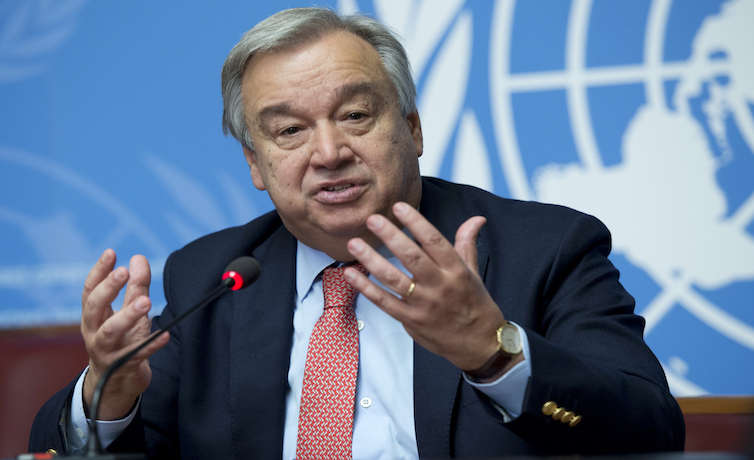News
COVID-19: UN Chief urges more funding for IMF to help poor countries

UN Secretary-General António Guterres on Tuesday called for more resources for the International Monetary Fund (IMF) to “put teetering economies back on their feet”.
Guterres made the call at a joint news conference with the Prime Ministers of Canada and Jamaica, Justin Trudeau and Andrew Holness, respectively.
The briefing was on the outcome of the high-level meeting on “Financing for Development in the Era Of COVID-19 and Beyond” held earlier in the day.
According to him, the pandemic has “snatched lives and livelihoods and taken an unprecedented toll on economies, particularly in the countries and communities least able to cope”.
He said the world had yet to see enough solidarity to deliver the massive and urgent support needed by those countries and communities.
“The international community should also increase the resources available to the International Monetary Fund, including through a new allocation of Special Drawing Rights and a voluntary reallocation of existing Special Drawing Rights.
“This is exactly the kind of crisis for which the IMF was created: to put teetering economies back on their feet.
“We will not see a global recovery until we have stopped the virus in its tracks,” he said.
The UN Chief renewed his call for debt relief for many countries urgently in need of it, and extension of the Debt Service Suspension Initiative to all developing and middle-income countries.
“The private sector, including the credit rating agencies, must be engaged in relief efforts.
“I am encouraged to see over 40 Heads of State and Government and the leaders of the IMF, the World Bank, the OECD (Organisation for Economic Co-operation and Development) and the African Union coming together around these bold policies.”
Guterres also urged the international community to take a collective action to provide $35 billion (N13 trillion) to the ACT-Accelerator.
The ACT-Accelerator is an international initiative, led by the World Health Organisation aimed at ensuring equitable access to COVID-19 diagnostics, treatments and vaccines.
“Of that, we need $15 billion (N5.7 trillion) immediately, to move from successful start-up to scale-up,” he said.
Holness said at the meeting, convened by Canada, Jamaica and the Secretary-General, a “rich menu of policy options” to address the impact of the pandemic was presented to world leaders.
“Our objective in organising this high level event was to secure buy in at the highest political level to mount an ambitious coordinated international efforts commensurate with the magnitude of the crisis.
“We have succeeded in gaining the support of world leaders to bold and decisive action to mitigate the devastating impact of the pandemic,” he said.
Noting that the global financial system could be used as a force multiplier, the Jamaica PM emphasised the need for the support and recovery to be across board.
“We must acknowledge that the need for action is particularly acute in relation to developing countries, which are the most vulnerable.
“Indeed, until every country recovers, there can be no greener, smarter and more equitable global recovery,” he said.
For his part, Trudeau, who earlier in the day announced an additional $400 million (N152 billion) humanitarian aid to fight COVID-19, stressed the need for equitable access to vaccines when available.
He also called for more time for “distressed countries to make bilateral debts payments, including Caribbean and small island states”.
Trudeau said: “We are working on concrete options that would help build a more resilient world for the short-medium and long term.
“The global community must not give up on the 2030 Agenda for Sustainable Development and the SDGs.
“In fact, we should seize this opportunity to do even more.
“We must listen to the needs of small island developing states and other vulnerable countries, and help carry their voices to the world bank, the G7, G20 and other organisations this fall.”
He promised to ensure that women and girls disproportionately affected by the socio-economic impacts of COVID-19 benefitted from the new funding.




 Davido's Net Worth & Lifestyle
Davido's Net Worth & Lifestyle 
